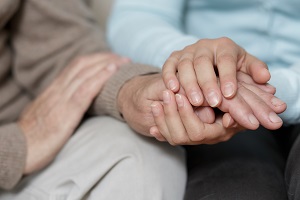 What happens after a loved one passes, at least in Southern Christian culture, is tremendous. Friends stop by with food, offer services, and pile on hugs and (mostly) comforting words. When my grandfather passed away suddenly in 1993, I was amazed at the outpouring of love from friends and family. No sooner did we get to my grandma’s house than the floodgates opened. People were everywhere hugging, bringing food, and crying together. Even to this day, I can remember the crazy amount of 2-liter sodas we had and there was, most definitely, plenty to eat.
What happens after a loved one passes, at least in Southern Christian culture, is tremendous. Friends stop by with food, offer services, and pile on hugs and (mostly) comforting words. When my grandfather passed away suddenly in 1993, I was amazed at the outpouring of love from friends and family. No sooner did we get to my grandma’s house than the floodgates opened. People were everywhere hugging, bringing food, and crying together. Even to this day, I can remember the crazy amount of 2-liter sodas we had and there was, most definitely, plenty to eat.
Nestled in that cocoon of love, there is a sense of hope in the midst of the pain. Maybe I can get through this. Maybe it is going to be okay. The steady stream of love and support is powerful and necessary, especially in those early days.
But, the early days pass. The funeral comes and goes, and then most people go back to work and get on with their lives. Cards and phone calls still come in, but not nearly as many as before. Soon, the condolences drop off almost completely. The season following the funeral can be harder than the week of the death simply because it is lonely.
As important as it is to be a willing and ready friend during the initial phase of a loss, it is just as important to continue being there after the dust settles. That may be the time your friend, sweetie, or loved one needs you most.
Keep these tips in mind as you seek to be supportive during the in-between stage of grief.
- Do not rush. People grieve at different rates. Phrases like “Are you not over that yet?” or “It has been six months. You have to move on,” are dismissive, hurtful, and extremely unhelpful. Not only that, but grief comes in waves. Just as the sun begins to peek out from behind the clouds, another storm rolls through. Being a friend takes patience and remembering that it could be you in need of the same kindness.
- Continue to fulfill needs while he or she adjusts. In the beginning, the help pours in and a sea of support does too. After a few weeks, it thins out; and, after a few months, it is almost completely gone. Stay a bit longer. Continue to find ways to show support. Grief zaps energy and keeping up with life’s demands is extra exhausting during the transition. Keep bringing meals. Work in the yard. There are a hundred little ways you can lighten his or her load.
- Be an available friend. Think of activities to enjoy together. Resist the urge to stay away for fear of not knowing what to say or do. The truth is you do not have to know what to say. Those who try too hard to comfort with words often end up saying too much (e.g., God must have needed him more. He is an angel now watching over you. At least…, etc.). We know words will not erase the pain, but companionship can lessen the sting and breathe courage back into a battered heart.
- Create a group of volunteers to attend necessary projects. When the body of Christ is working together in harmony, it is beautiful to watch. I appreciate this so much about our church. When someone is in need, hardly any time passes before women are bringing meals, men are helping out with needed labor, and prayers are going up to the Father. Whether it is an outdoor workday, a full spring cleaning, or a pantry stocking that is needed, see if you can assemble some willing bodies who want to serve.
- One of the greatest gifts we can provide anyone is our fervent prayers. James 5:16 reads, “Therefore, confess your sins to one another and pray for one another, that you may be healed. The prayer of a righteous person has great power as it is working” (ESV). We are helpless in these situations, but God is not. God can comfort and provide for our loved ones in ways we never can. Remind the grieved that you are praying and be specific about how you are praying. “I am asking God to provide the extra income you need. I am asking God to send someone special to minister to your children. I am asking God to put the song back in your heart.”
When my godfather passed away last year, I remember looking at my godmother surrounded by many friends and family, and thinking, “What will happen next week when everyone goes back to their lives?” As hard as the visitation, funeral, and graveside were, it was those upcoming days that concerned me most.
Perhaps the sweetest way you can bless a hurting friend is to be a rock he or she can count on in the days ahead. If you have ever lost someone dear, you know how priceless that kind of friendship is; and, you know what a blessing it is to have someone who can endure your anger, understand when you want to be alone, and be ready for fun when the clouds begin to break.
In what specific ways would you want a friend to help you during the weeks and months following the death of a loved one?
Picture: iStockPhoto/KatarzynaBialasiewicz